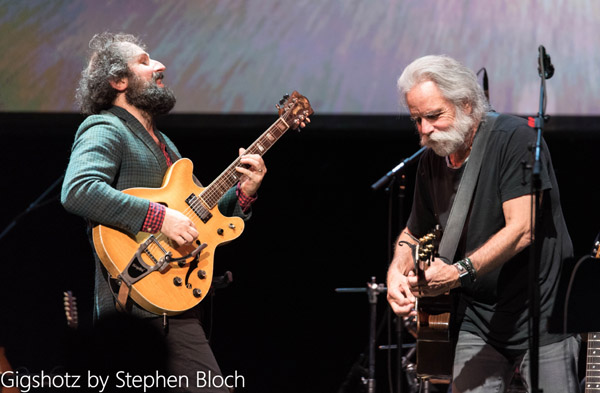
Josh Kaufman and Bob Weir in Chicago, 10/20/16- photo by Stephen Bloch
Bob Weir remains active and engaged, well over five decades since he first took the stage with The Warlocks. On September 30, he released Blue Mountain, his first studio album to focus on original compositions since RatDog’s 2000 record Evening Moods (here’s a link to his recent discussion with Blue Mountain co-songwriter Josh Ritter). Weir took the road with this material last month, joined by Blue Mountain producer Josh Kaufman and many of the musicians who appear on the record, including Steve Kimock, Jon Shaw and The National’s Bryan and Scott Devendorf. In the following conversation, he looks back on those events, as well as his recent collaborations with Phish, Joe Russo’s Almost Dead and the musicians who will join him at Los Muertos con Queso in January. Weir also shares some thoughts on the future of Dead and Company, as well as the imminent arrival of President Donald J. Trump.
In hearing you speak about Blue Mountain, one thing that has struck me, is the way that cowboys influenced your musical approach—not through their own music but through the improvisational nature of their lifestyle.
There’s that frame of mind that cowboys are famous for that this will get done no matter how that has to happen. I think that does bleed over into my music a bit. No matter how unlikely or challenging something is apt to be you have to do it, you have to rise to the occasion.
In recording this collection of songs, did you have any underlying goals beyond personal expression?
I don’t really have much in the way of goals generally speaking when I write, I just invite a notion to a character to step through and express him or herself and I’m just there with a pen. That goes for the music as well. It gets to the point where I’m willing to camp out and tell those stories and so those kind of characters came through. It’s a place that I remembered, a cozy place where I set up camp and then entertained the quotes that came through.
Was this something that had been sitting in your head for 50 years or did relatively recent events lead you down the path?
It’s both. I had been entertaining notions of doing something like that although for a long time I had no idea how I was going to go about it. Then when Josh Kaufman and his coterie propositioned me with a notion of doing an album and they wanted to do cowboy tunes, it occurred to me, “Well okay let’s go there, let’s look at that” and this is what emerged.
It sounds like the material from Josh Ritter came to you in varied forms, in terms of their completion. With a song like “Whatever Happened to Rose,” for instance, can you share insight into what was presented to you and how you worked with it?
“Whatever Happened to Rose” came pretty intact. I think it was relatively complete, in regards to the lyrics and the music was kind of formed as well. I would sit with the character for a little bit and see what the character had to say—that’s a matter of sort of packing it under your pillow for a little bit and seeing and then breaking it out and playing it to see where the music wants to go and what line here or there needs fluffing up a bit.
The character doesn’t generally arrive fully formed. Generally speaking a character will knock on the door and won’t reveal itself in full detail until you start picking the song around it, until you sit down with a guitar and start working with it. That’s what happened in both these cases. In “Whatever Happened to Rose” I got to know the character a little bit better and some of the lines changed and some of the music changed and all that kind of stuff.


No Comments comments associated with this post